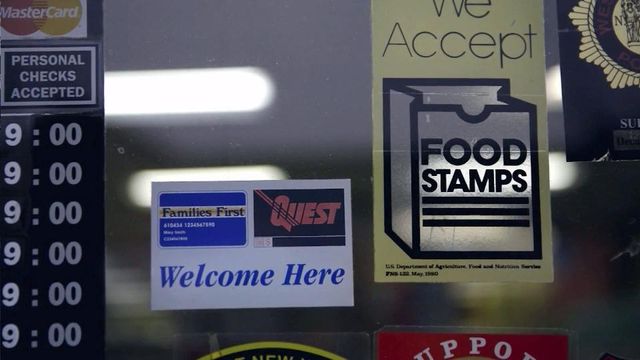Senate budget would cut off food aid to 133,000
A provision tucked deep within the 362-page Senate budget proposal would mean the end of federal food assistance for tens of thousands of low-income North Carolina households.
Posted — UpdatedOfficials at the state Department of Health and Human Services estimate the change would cut food benefits from the Supplemental Nutrition Assistance Program, or SNAP, to 133,000 people – 55,000 of them under 18.
In 2010, during the depths of the recession, North Carolina expanded its eligibility as permitted under federal law. The state extended coverage to households earning between 133 and 200 percent of the federal poverty level that were also receiving some other public assistance, such as disability payments.
Section 11C.11.c on page 142 of the budget bill would ban DHHS from granting "categorical eligibility," also known as broad-based or extended eligibility, "unless expressly required by federal law." Federal law covers only individuals who earn less than 133 percent of the federal poverty level and who also receive other assistance.
DHHS Deputy Secretary Susan Perry-Manning explained that the program is funded by the federal government, not the state, so cutting it has no effect on the state budget.
"It doesn’t save the state any money," Perry-Manning said. "These are federal dollars that are not capped."
Asked to explain the reasoning behind the cut, Sen. Ralph Hise, R-Mitchell, said Senate leaders believe that allowing people to qualify for SNAP through qualifying for another service creates a double standard and allows people to avoid an asset test otherwise required to prove need for SNAP assistance.
For example, Hise said, the state's child care subsidy program is based on household income as a percentage of median state income, not the federal poverty level, and it's based only on income, not on assets.
"You’ve got a family of four making $40,000 who can’t qualify because their children are school-aged, but you’ve got another family that maybe makes more, but who qualifies for child care subsidies and therefore qualifies for food stamps as well," he explained. "What we are eliminating is that fact that another program automatically qualifies you for food stamps."
Hise said the numbers provided by DHHS to WRAL News are higher than the numbers the department provided to Senate budget writers. He said he was ready to amend that provision Friday night but opted not to after DHHS liaisons asked for the provision to be stricken completely, rather than amended.
"You talk to anyone who’s seen the tremendous growth that we’ve seen in our food stamp program over the last eight years despite our recovering economy," he said, adding that the state's current SNAP program is much more generous than programs in other states.
Another provision included in a budget amendment that passed at about 3 a.m. Friday, shortly before the Senate gave final approval to the $22.9 billion spending plan, would cut education funding to children in several poor counties. It came after Democrats who represent those counties angered Republican leaders during the budget debate.
That amendment also wiped out funding for fresh produce in convenience stores in areas considered "food deserts" and cut a position from Democratic Gov. Roy Cooper's staff.
The budget is now in the House, where budget chairmen are scheduled to begin work on their changes this week.
Related Topics
• Credits
Copyright 2024 by Capitol Broadcasting Company. All rights reserved. This material may not be published, broadcast, rewritten or redistributed.





